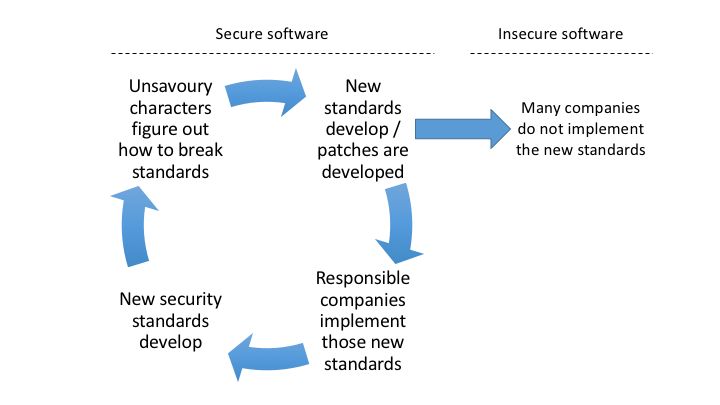Blog How Secure is your data?

At Plato, we believe that you should have clarity on how we protect your clinic’s data. IT security is like a game of cat and mouse – a software needs to use the latest encryption and security standards to stay ahead of anyone trying to gain unauthorized access to their data.
But that’s okay, my software is locally installed. No one should be able to access it, correct
Locally installed software actually have a host of security issues. First, they can be accessed by anyone in your wifi network. Second, if someone at the clinic downloads malware by accident, that can either destroy your data or allow it to be accessed without your authorization. Third, if your server crashes, you may lose data – and every hard disk has a 4.8% chance of failing once a year.
Web based software do not face the same challenges as locally installed software.
First, Plato uses AES in-flight encryption so that no one tapping on to your WiFi can access data – it is encrypted before it goes to any server. Second, if a staff member accidently downloads malware, that will not affect Plato, or indeed any other web based software. That is because these software run on a secure server, managed by a team of engineers, who actively ensure they are secure. Third, web based software providers like Plato can store your data on multiple hard disks, rather than one – so that even if one hard disk fails, your data will still be kept safely on others.
Regular updates: how to keep your data safe
Web based software is also easier to update and improve than locally installed software. IT security is like a game of cat and mouse – regardless of whether you use web or locally installed software, regular security updates are critical to keep your data protected. That being said, it is a lot easier for an engineering team to update web-based software. Moreover, if you use web-based software, an engineering team is also managing your servers and ensuring they are safe.
- New security standards develop – The IT industry as a whole works to develop new standards for encryption, data protection, and data storage. Software companies that provide their customers with regular updates will update their software right away to reflect new standards.
- Unsavoury characters figure out how to break standards – No encryption standard is perpetually perfect (though AES-256 in-flight encryption, what Plato uses, is pretty close). Moreover, if a technology is commonly understood by programmers and IT enthusiasts, more vulnerabilities are uncovered and known as well. It is easier to find vulnerabilities in older technology.
-
New standards develop, and some (but not all) companies or software adopt them – Older companies with few developers and locally installed software often struggle to update their security regularly. These older companies face a few challenges –
- their technology is so old that it is not compatible with the latest security requirements;
- they do not have enough talented developers on their team to implement new changes quickly;
- no one (or very few people) on their team track security trends and issues as they arise;
- or, they have no incentive to provide your clinic updates, because your clinic owns a version of their software.
At Plato, we track security issues in the industry at large and ensure that your software is regularly updated to address them. When you use Plato, our servers run multiple master:master replications of your clinic management software – it feels like you’re using one software, but in reality every click you make is logged into multiple copies of Plato, ensuring no data is ever lost. Finally, Plato’s team stores multiple secure copies of your data in the cloud, so that you will never lose data to a hardware failure.
Want to find out more about Plato or understand how your clinic’s security can be improved?
November 1, 2017
